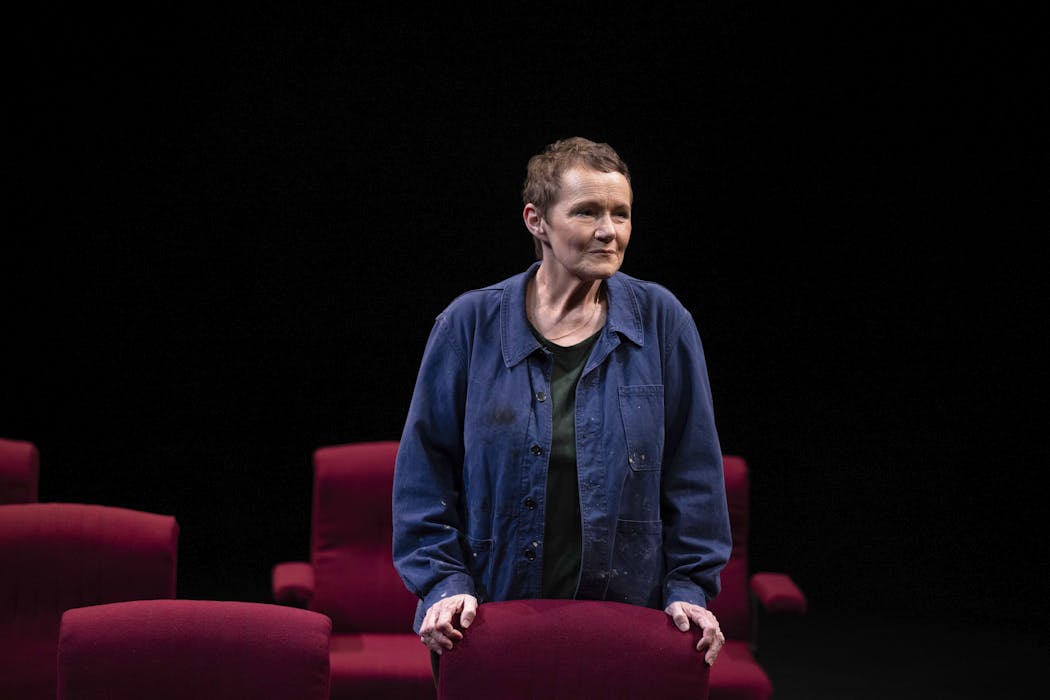A Memoir asks the big questions about death – but ends up strangely unmoving
- Written by Jonathan Graffam-O’Meara, PhD Candidate in Theatre, Monash University

What makes a good death? Quietly surrounded by friends and family or going out in a flash of blazing glory (whatever that means)?
Would you like to know when you’re going to die?
Will knowing when you die help you to appreciate all the small finalities – the last time you drive a car, the last touch of grass on your fingertips, the last time you feel your partner’s breath on your cheek, a final kiss on the lips?
Or do these small closures matter at all when looking backwards is a distraction from “the great unknown” that lies ahead?
Do you deserve the right to choose when you die?
Author Cory Taylor was confronted with these questions when diagnosed with melanoma after a biopsy of a mole on the back of her right leg. She was just about to turn 50.
Death in modern Western society exists in a peculiar limbo – simultaneously sanitised and sensationalised. We’ve outsourced dying to hospitals, nursing homes and palliative care units, creating physical and emotional distance that leaves too many people unprepared for when loss arrives.
In her 2016 book Dying: A Memoir, published just months before her death, Taylor writes:
For this is one of the most lamentable consequences of our reluctance to talk about death. We have lost our common rituals and our common language for dying, and must either improvise, or fall back on traditions about which we feel deeply ambivalent.
Taylor exposes the cost of our cultural avoidance: by refusing to engage meaningfully with mortality, Western society has left individuals to face death’s deepest questions in isolation.
Playwright Benjamin Law brings Dying: A Memoir to the stage in a one-woman show starring Genevieve Morris, directed by Jean Tong for Melbourne Theatre Company.
Immediate intimacy
Morris gives a commanding performance. She brings a formidable presence to her portrayal of Taylor and fluidly inhabits a range of characters in Taylor’s world: doctors, siblings and acquaintances connected to Exit International, a support and advocacy group for voluntary euthanasia.
Tong’s direction creates immediate intimacy with the audience. Morris begins out of character, gently acknowledging the difficulty of discussing death while honouring Taylor, before the performance proper begins. This connection with her audience is strengthened across the show.
Set and costume design (James Lew), lighting design (Rachel Lee) and sound design (Darius Kedros) all function to support Morris’ delivery, its constant movement and fluidity.
Red theatre chairs on wheels form the main set piece, which Morris rearranges into various configurations. The surrounding black walls feature small reveals and cracks of light that reflect thematic shifts.
The sound design anchors each scene with precision: the hum of a doctor’s waiting room, the noise and clatter of a restaurant, the clinical quiet of a psychologist’s office. Mostly understated, it punctuates key moments with purposeful intensity, working to mark emotional shifts.
Oppressive lighting pervades the production, its unrelenting bleakness mirroring the subject matter too literally. The lack of variation or contrast flattens what could be a more visually complex exploration of its themes.
Evading the emotionally complex
Law’s persistent examination of the end of Taylor’s life within his adaptation reveals an evasion of the book’s more emotionally complex and spiritually challenging entanglements.
Taylor’s memoir spans three interconnected acts; Law’s adaptation fixates primarily on the first, circling questions about euthanasia and the right to a “good death” in ways that lean into and recapitulate parts of popular debate.
Acts two and three of Taylor’s memoir overflow with childhood recollections – vivid, nostalgic landscapes painted through thick descriptive prose and family memory. These sections reflect closely the relationship with her mother and father, giving rise to questions of: where do we come from? What is home? How are we formed and by who?
This complex and poetic examination of life is excised from Law’s play. But, for his part, he manages to embed his signature biting wit while telling Taylor’s story.
On the frustrations of managing one’s final affairs, and specifically password retrieval, Morris turns to the audience and flatly delivers the line: “If cancer doesn’t kill me, two factor authentication will.”
The situation with an over-enthusiastic therapist is described as a “government-subsidized hostage situation”.
These moments of searing humour help make the story feel fresh and grounded.
However, Law chooses didacticism to end the play as Morris steps out of character again. The choice drains the production of Taylor’s sharp intelligence and emotional depth, leaving the audience instructed rather than stirred. Despite a chorus of sniffles amongst the audience, the ending is strangely unmoving.
It avoids the mess and the grit that fascinates Taylor in composing her memoir. She quotes T.S. Eliot:
In my beginning is my end Old fires to ash, and ashes to the earth Which is already flesh, fur and faeces Bone of man and beast, cornstalk and leaf
The kind of raw and unflinching acceptance of death’s physical reality that inspired Taylor is upended in favour of what is, sadly, a little too sterile and neat.
Dying: A Memoir is at Melbourne Theatre Company until November 29.
Authors: Jonathan Graffam-O’Meara, PhD Candidate in Theatre, Monash University



















